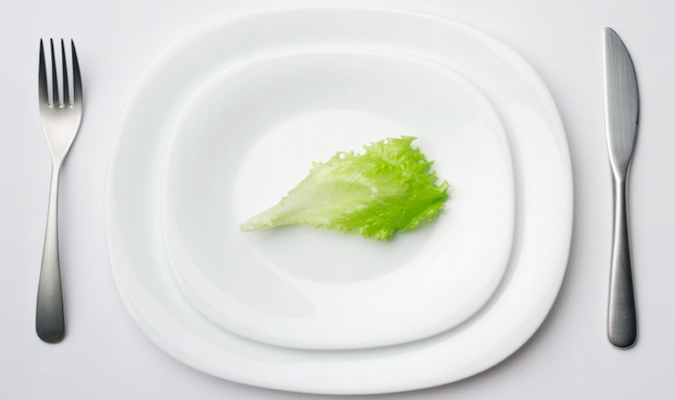The world is obsessed with (counting) calories. Proclaimed to be the currency of weight loss, calories are all the rage. We’ve convinced ourselves that the caloric input vs output model is the end-all and be-all of weight loss.
Only what if it isn’t? What if we’re wrong? What if restricting calories isn’t the full solution? That’s the question I want to explore in today’s (lengthy) article.
I’m going to reveal the four problems I see with calorie restriction and what I deem to be a better (more complete) way to long-lasting fat loss. Let’s dig in.
Problem #1 – Calorie restriction does not work over the long term
Let’s start with a statement that contradicts this sub-headline (why not).
If you’re overweight by more than 15-20 pounds, restricting your caloric intake (i.e. going into a caloric deficit) will help you shed fat. Burning more calories than you consume will work. Regardless of what you eat, if you eat less you will lose weight.
Heck, even the professor who went on a Twinkie diet was able to lose weight.
So yes – putting yourself in a caloric deficit for a period of time does work.
But the question is for how long?
What happens when you reach your desired weight? What happens when you go back to your old way of eating?
That’s where the first problem of calorie restriction comes into play: it’s not sustainable and therefore only offers temporary results.
And when you do stop restricting your calories…
Nine times out of ten, the weight comes back. And usually with interest. You end up worse off than when you started.
Even the best weight loss clinics in the world can’t get the formula down…
Weight Loss Study
Sourced from Gary Taubes’s book Why We Get Fat:
One of the biggest studies ever to be done on the topic of weight loss back in 1980 by researchers from Harvard and the Pennington Biomedical Research Center (considered the most influential academic obesity-research institute in the US) went like this:
The study enrolled more than eight hundred overweight and obese subjects. The subjects, who began the study, on average, fifty pounds overweight, were randomly assigned them to eat one of four diets.
These diets were marginally different in nutrient composition, but all were substantially the same in that the subjects were supposed to under-eat by 750 calories a day (quite a significant amount).
The subjects were also given “intensive behavioral counseling” to keep them on their diets (something the average person wouldn’t get).
What happened?
After the study, participants lost, on average, only nine pounds (most of it in the first six months), and most of the participants were gaining weight back after a year.
The study above (and many more like it) clearly shows that eating less is a temporary solution. It is not the long-term solution to our obesity problem.
Problem #2 – Restricting calories is not necessarily good for your health
Let’s start with another statement that contradicts the sub-headline, shall we? I’m getting kind of good at these.
If you’re overweight and you lose a substantial amount of weight, your health will markers improve. But this can be misleading (at best).
To understand this better, let’s go back to the twinkie diet guy.
Here’s what happened to Dr. Haub, the professor who shed 27 pounds in two months by cutting his calories by eating primarily junk food:
His “bad” cholesterol, or LDL, dropped 20 percent and his “good” cholesterol, or HDL, increased by 20 percent. He reduced the level of triglycerides, which are a form of fat, by 39 percent. His body fat percentage also dropped from 33.4% to 24.9%. [source]
What does this mean? Should we all be jumping on the Twinkie train?
Well…not necessarily.
Blatner, a dietician from Chicago, said this…
“When you lose weight, regardless of how you’re doing it – even if it’s with packaged foods – generally you will see these markers improve when weight loss has improved.”
The worst thing you can do (for your health) is ignore how the weight was lost.
Many calorie-counting activists like to sell the “eat whatever you want (in the right portions) and still lose weight” model. And it’s a damn effective selling point. Junk food? Go for it. Processed junk? All good. Fast, fried shit? It’s all you my friend.
As long as you keep your calorie count in check, it’s all good right??
Well, it definitely sounds nice, but let’s look at a hypothetical scenario here that will shine some light on this “strategy”. Note that I created this hypothetical situation.
HYPOTHETICAL SCENARIO THAT I RANDOMLY CAME UP WITH
Let’s say we have two overweight subjects (roughly the same weight), both currently consuming 2,250 calories each day. Each is offered a different diet to follow over a 60-day long period.
Subject A is asked to consume 1,500 calories worth of Twinkies and Dorritos each day for 60 days. Subject B is asked to consume 1,500 calories worth of lean chicken breast and green vegetables for 60 days.
If my math is right, both go into a caloric deficit of 750 calories and both maintain the same level of activity.
(Work with me here.)
Now barring any crazy side effects or unforeseen conditions, each person will lose weight. There are calculations out there we can use to estimate how much, but I have better things to do with my time.
Now the real question is: who will come out healthier at the end of it all?
I’m aware that the scenario above is a little exaggerated (I don’t care), but it goes to show that the source of calories does matter.
Quality does matter.
For too long, we’ve been conditioned to associate good looks with good health. We’ll do whatever it takes to shed the weight, even if it means foregoing the health part of the equation.
We’ve been trained to think about food in the sense of “will this help me lose weight or gain weight” when instead we should be thinking about food in the sense of “will this food nourish my body or will it just satisfy a craving.”
Problem #3 – Counting calories leads to an awful relationship with food
Let me ask you something…
Do you really want to spend the rest of your life thinking about how many calories you’re consuming each and every day?
If you’re like most people, I assume not. But that’s what would be required of you.
Although it would probably get easier over time (you would become a master of eyeballing 50 calories), it’s just not a way to live my friend.

Guess how many calories are in this little guy [image source].
The idea of having to keep track of how much of this and that you’re putting in your body at all times forever doesn’t lead to a good relationship with food.
You start judging food based on its caloric input, instead of the nourishing elements it may have to offer your body.
In my opinion, you should never have to quantify food. Instead, you should be focused on qualifying your food.
Let me tell you why.
Quality is everything.
If you eat quality foods, then it really shouldn’t matter how much of it you eat.
Now you might be wondering how this makes sense. After all, even though eating a plate of lean, organic chicken with fresh vegetables may offer your body nutrients, eating 16 servings of it in one sitting can’t be good for you.
And you’d be right.
But you’re forgetting an important characteristic of the human body.
It adapts extremely well (for better or worse).
When you switch your focus from quantity to quality, many good things start to happen inside your body.
Apart from the nourishing, energy-boosting advantage of eating quality foods, your hormones begin to regulate and your body’s communication system improves.
Suddenly, one healthy serving of chicken triggers hormones in your body (like leptin, the “satiety” hormone) to inform the brain that you have actually satisfied your hunger.
That’s the advantage of focusing on quality instead of quantity.
Problem #4 – Restricting calories does not help you lose the last few pounds
Here’s a common scenario you may have experienced before…
You started exercising, you cut down your eating (calorie restriction), and you started to get some damn sexy results.
Then, out of nowhere, you hit a wall. You stopped progressing. No matter how hard you trained or how little you ate, you were stuck.
Remember that your body is designed for two things: survival and procreation.
We’ll save the procreation part for another post, but when it comes to survival your body will do everything in its power to make sure it lives another day.
And that includes locking up your fat stores when it thinks it’s going to starve.
Truth is, once you hit a plateau it’s all about hormones and how the food you choose to eat impacts those hormones.
Again, after a period of time, going into a caloric deficit simply stops working.
The Better Approach to Fat Loss
So what have we learned so far…
We’ve learned that the calorie-counting model can help you lose weight, but only up to a certain point. The model is far from sustainable. It’s not healthy. And it definitely doesn’t help you build good eating habits.
So what’s the alternative?
The solution I like to use is a simple two-step approach.
Here is the simple two-step approach that works:
Step 1: use the calorie-restriction model in a strategic way until you reach your desired weight.
Step 2: once you reach your desired weight, switch to a maintenance nutrition strategy that is built around the same principles as step 1.
What we’re doing is simply leveraging what works.
Restricting calories works for shedding fat so we use it temporarily (and strategically) to reach our desired weight. But once we reached that desired state, we are best served to switch to something more effective and sustainable – a maintenance nutrition plan.
However, there are some subtle, yet important differences between traditional calorie-restricting methods (that I’ve spent the first part of this article bashing) and how I like to approach caloric restriction.
You have to approach it strategically.
First, you can’t just eat whatever you want. You have to focus on quality. Even though you’re restricting your caloric intake, you still have to fuel your body with the right (nourishing) foods.
Second, you have to introduce an element of surprise. To overcome problem #4, you have to find a way to tell your body that it is not in starvation mode. And you do that with strategically positioned cheat days.
These elements set you up for an easy transition into the maintenance phase.
Now there’s much more to this madness (much more than I can get into here), but it will all be outlined in my upcoming fat loss nutrition book (coming really soon).
If you’re interested in hearing more about the launch of the nutrition book that I’m putting together, click the green button below and I’ll make sure that you get notified when it’s ready.
Thanks for reading! If you have any questions about these methods, feel free to leave your comments below. Cheers!


